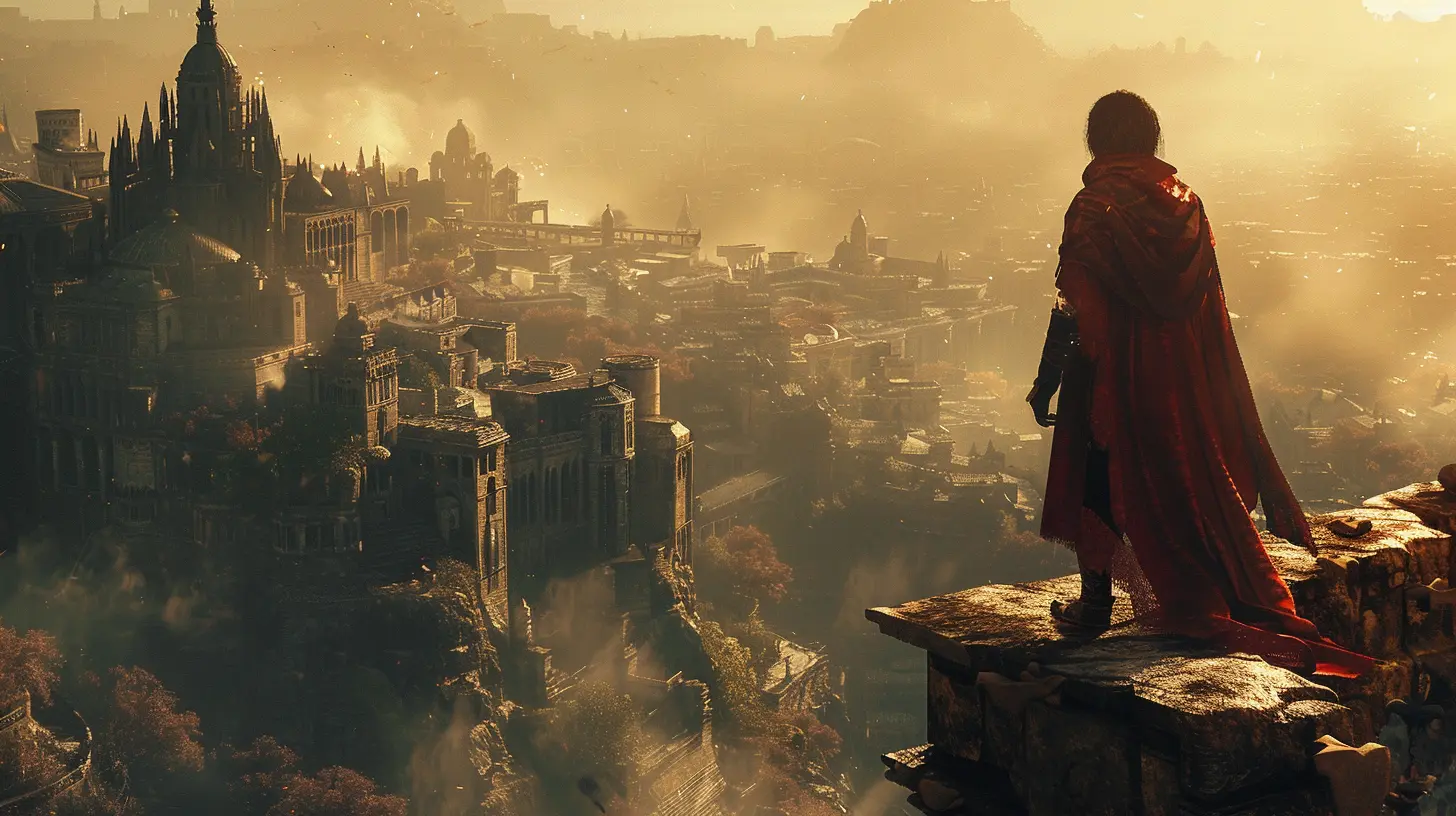Player Agency vs. Story Control: The Balancing Act of Narrative Games
25 May 2025
Gaming is a unique medium, don’t you think? Unlike books or movies, where the audience is passively taking in the experience, games invite you to take the reins—or at least, they should. This is where the age-old tug-of-war between player agency and story control comes into play. How much freedom should players have to shape their own experience? And how much control should developers retain to tell the story they envision? It’s a balancing act, and nailing it can make or break a narrative game.
In this article, we’ll dive into the nitty-gritty of player agency and story control, why they often clash, and how some games manage to strike the perfect balance. Whether you're a developer, a budding writer, or just someone who loves a good story, there’s a lot to unpack here.
What Exactly Is Player Agency?
Alright, let’s start with the basics. At its core, player agency refers to the sense of freedom and decision-making power a player has in a game. It’s that feeling of being the hero (or anti-hero) in your own story. Your choices matter, your actions have consequences, and the world reacts to what you do. Sounds great, right?Think of games like The Elder Scrolls V: Skyrim—you can go anywhere, do anything, and your path is almost entirely up to you. Want to be a stealthy thief sneaking through dungeons? Done. Prefer running headfirst into combat as a battle-hardened warrior? Also doable. It’s all about you, your desires, and how you shape the game’s world.
But here’s the catch: too much freedom, and the game risks feeling unstructured or aimless. Have you ever played a game for hours, only to wonder, "Wait… what’s the point?" That’s the danger of unchecked player agency.
What About Story Control?
On the flip side, we have story control, where developers (or writers) tightly guide the narrative. Here, the storyteller is in the driver’s seat, steering the player through a compelling, pre-defined plot. Games like The Last of Us and Red Dead Redemption 2 excel at this. They tell strong, emotional stories that leave you breathless—but your actions don’t necessarily shape the plot. Sure, you can make some decisions, but ultimately, the story stays on rails.When done right, story control creates memorable, cinematic experiences. You know exactly why you’re invested in the characters and where the plot is taking you. But here’s the double-edged sword: the more control the game takes, the less agency the player feels. And if players start feeling like glorified passengers, that’s a problem.
The Tension Between Freedom and Structure
So, why is this balancing act so tricky? Well, it’s because player agency and story control are inherently at odds with each other. The more freedom players have, the less control developers have over how the narrative unfolds. On the flip side, the more developers dictate the story, the less freedom players feel.It’s kind of like a parent letting their kid ride a bike. Do you let them speed off on their own, wobbling and risking a crash (player agency)? Or do you hold on to the back of the seat, guiding them in a straight line but stifling their independence (story control)? There’s no single “right” answer, but the sweet spot lies somewhere in the middle.
How Games Attempt to Balance the Two
The balancing act isn’t easy, but some games have nailed it. Let’s break down a few techniques developers use to harmonize player agency and story control. Trust me, it’s an art form.1. Branching Narratives
Some games tackle the problem head-on by offering branching narratives. Here, your choices directly impact the story, with multiple paths leading to different outcomes. Telltale’s The Walking Dead series is a great example. Do you save the kid or the adult? Do you side with one faction over another? Every choice feels weighty because it has ripple effects down the line.But—and this is a big "but"—branching narratives require a ton of effort to pull off. Every branch means more writing, coding, voice acting, and testing. Plus, if the differences between branches are too small, players might feel like their choices didn’t really matter.
2. Illusion of Choice
Here’s a cheeky trick: sometimes, games only pretend to give you freedom. This is called the illusion of choice, and it’s surprisingly effective when done well. Take Mass Effect, for instance. Sure, you’re making choices and shaping relationships, but many of the “big” decisions funnel back into the same overall narrative arc. The beauty here is that players feel like they’re in control, even if they’re not.It’s smoke and mirrors, but hey, it works. Just don’t overdo it—if players catch on, they might feel cheated.
3. Open Worlds with Anchored Stories
Another approach is to combine an open world with strong, anchored story missions. Games like The Witcher 3: Wild Hunt excel at this. You can spend hours exploring side quests, hunting monsters, or just goofing around. But when you’re ready to engage with the main story, it’s there, waiting for you, with all the narrative punch you could ask for.This method gives players the best of both worlds: freedom to explore on their terms, but structure when they want it. It’s like being handed a map and being told, “Go wherever you want, but here’s where the treasure is.”
4. Emergent Storytelling
Then there’s emergent storytelling, where the narrative isn’t scripted but arises naturally from the gameplay. In Minecraft, for example, there’s no traditional story. Instead, the game gives you tools to create your own adventures. Found a cave full of diamonds but got ambushed by creepers on the way out? That’s your story.While this approach maximizes player agency, it’s not for everyone. Without a guiding narrative, some players might feel lost or unmotivated.
Why the Balance Matters
Here’s the thing: getting the balance right is critical because it impacts how invested players feel in the game. When done well, the game leaves a lasting impression—you remember not just the story, but your story. That’s what keeps players coming back and talking about the experience for years to come.But when a game leans too far in either direction, it risks alienating its audience. Too much player agency, and the story can feel shallow or inconsequential. Too much story control, and players might feel like they’re just going through the motions. Either way, you end up with a missed opportunity.
So… Who’s Doing It Right?
Let’s wrap this up by shouting out a few games that absolutely crush the balance between player agency and story control:- Disco Elysium: This detective RPG lets you shape your character’s personality and decisions to an insane degree. But it also has a strong narrative backbone that pulls you along. It’s a beautiful marriage of freedom and structure.
- Hades: Supergiant Games nailed it with Hades. The roguelike format gives you tons of freedom to play how you want, but the story unfolds organically through repeated runs. It’s proof that narrative and gameplay don’t have to be at odds.
- Firewatch: A more linear game, sure, but your interactions with Delilah feel personal and impactful. You’re not given total control, but you’re still an active participant in the story.
Closing Thoughts
The balancing act between player agency and story control is one of the most fascinating aspects of game design. At the end of the day, it’s all about finding that sweet spot where players feel empowered, but the story never loses its momentum. Whether you’re crafting sprawling open worlds or tightly scripted dramas, the key is respect—respect for the player’s choices and respect for the narrative’s integrity.What about you? Do you prefer games where you’re free to do whatever you want, or do you like a good story to guide you? Let’s chat in the comments—I’d love to hear your thoughts!
all images in this post were generated using AI tools
Category:
Game DesignAuthor:

Aurora Sharpe
Discussion
rate this article
3 comments
Yolanda McKittrick
Great article! The exploration of player agency versus story control in narrative games is fascinating. Striking the right balance can transform a game’s experience, making it both immersive and engaging. I look forward to seeing more discussions on this topic!
June 14, 2025 at 3:13 AM

Aurora Sharpe
Thank you for your insightful comment! I'm glad you found the exploration of player agency and story control engaging. I look forward to further discussions as well!
Rocco McCall
Striking a balance between player agency and story control is essential for narrative games. When players feel their choices matter within a cohesive story, it enhances engagement and emotional investment, creating a more memorable gaming experience.
May 30, 2025 at 2:35 PM

Aurora Sharpe
Absolutely! Balancing player agency and story control is crucial for crafting immersive narratives that resonate with players, enhancing both engagement and emotional impact. Thank you for your insight!
Lincoln McGuire
Great article! I love how you explored the delicate balance between player agency and story control—such an intriguing topic for narrative games!
May 27, 2025 at 4:58 AM

Aurora Sharpe
Thank you! I'm glad you enjoyed it and found the topic intriguing. It's a crucial balance that shapes the gaming experience!



